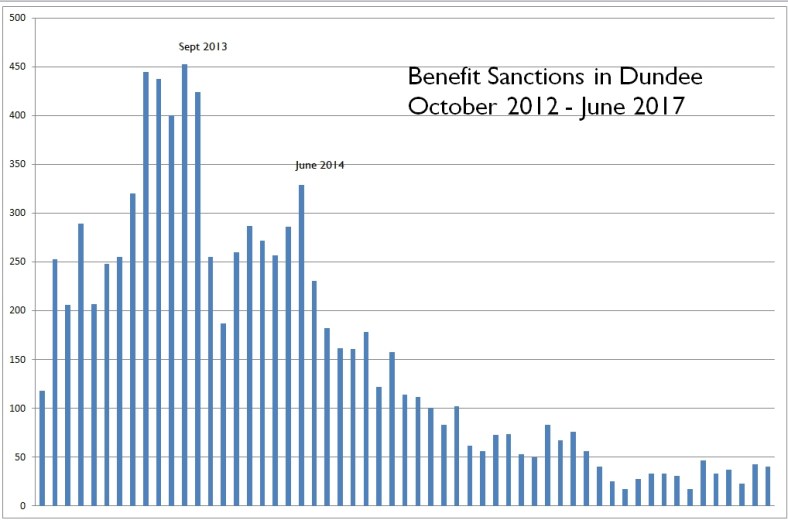
It’s probably incompetence and a culpable lack of training rather than anything more deliberate: a failure on the part of DWP staff to listen properly or explain adequately or even to be fully aware of the rules, which is then coupled with a very understandable lack of expectation on the part of those hoping for social security payments. But at this week’s stall we came across two people who had been wrongly led to believe that they were not eligible for anything. Dan had recently lost his job, but because his wife was earning he had been told that he would get nothing. We explained that the national insurance he had been paying when in work entitled him to six months ‘contribution based’ JSA, which was not effected by any other money he might have or his wife might earn, and we gave him the phone number to make an application.
We were thinking of packing up a little early as it had started to rain, but luckily we thought better of it, so we were still at our post when Jackie emerged from the jobcentre having been told that she, too, was not eligible for any benefits. It only took a few questions to discover that Jackie is a single Mum with a child of one and no money, which makes her fully eligible for Universal Credit, even though she only works four hours a week. We sent her round to Shelter to get a benefit check and sort out her application.
Jackie was the second person we had sent to Shelter. Sandra was getting a small amount of PIP but had developed mobility problems since her assessment. We suggested that she should ask for a benefit check and discuss the possibility of putting in for a supersession on her PIP claim to take account of her new situation.
We also put another woman in touch with Welfare Rights. She had received a letter from the Council threatening legal proceedings for thousands of pounds in rent arrears, but had not asked anyone for advice and help. The standard letter told her to sell her car (she doesn’t have one) and other possessions.
Since Universal Credit full roll-out came to Dundee we have suggested to people that if they can manage to survive without it, it could sometimes be better to avoid signing onto Universal Credit while waiting for the result of a Mandatory Reconsideration following failure to get ESA. Signing onto Universal Credit would transfer them to this permanently, when they might be better off staying in the old system. So we were interested to meet someone who seemed to have been given just that advice by a professional welfare advisor. He was surviving with the help of his brother and other family members, and we reassured him that even if his Mandatory Reconsideration was not successful (most aren’t), as soon as he put in his ESA appeal proper he could go back on ESA payments again.
Michelle was also waiting for the result of a Mandatory Reconsideration after being found ‘fit for work’ and refused ESA. This had happened before Dundee’s Universal Credit full roll-out, so she had been able to sign onto Jobseeker’s Allowance. After doing this you should be able to put in a doctor’s line to say that you are now not fit for work or to look for work, just like anyone else on JSA. But the Jobcentre had refused to accept Michelle’s doctor’s note. This is a problem we have come across before (we even have a web-page on it) – and there did seem to be a deliberate flouting of the rules at that time – but, as before, we have written to the jobcentre to remind them of the workings of their own system.
Thanks to Norma, Tony, Gary and Dave for surviving a cold afternoon at the stall.
* * *
Meanwhile, the UK Government is gearing up to force many more sick and disabled people through their work ‘cure’, pulling health practitioners, charities, and not-for-profit community organisations into their web of control. Their latest strategy paper is a model of propaganda, presenting their actions as a response to the very real problems faced by disabled people whose desire to work is thwarted by the lack of accommodation to their needs. The level of cynicism that allows the government to exploit this genuine need and use it to put yet further pressure on sick and disabled people should shock even hardened politicians. These plans ought to come with a health warning stating the increase in mental and physical health problems and untimely deaths consequent on the Government’s whole approach to disability testing and ‘fitness to work’.
And of course we’ve not forgotten that central plank of ‘welfare reform’, Universal Credit, even if it has dropped out of the headlines. For anyone in Dundee or the surrounding area, we are running a talk and discussion about Universal Credit and how to fight it on Wednesday 6th December at 7.30 in the Butterfly Café, opposite Waterstones’ bookshop.
















